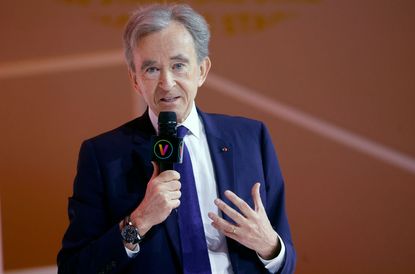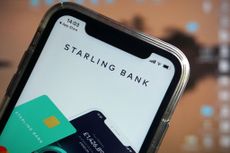What is Bernard Arnault's net worth?
We look into Bernard Arnault's net worth - one of the world’s richest people


According to Bloomberg, Bernard Arnault’s net worth is $195 billion, making him the second richest person in the world after Elon Musk.
Bernard Arnault is one of the largest shareholders of luxury group LVMH, a company he's built over the past few decades. Like most of the world’s richest people, such as Bill Gates, Warren Buffett and Jeff Bezos, Arnault’s hard work building a global business empire has paid off handsomely.
Here we look at how Bernard Arnault built his fortune and the factors contributing to his net wealth today.
Subscribe to MoneyWeek
Subscribe to MoneyWeek today and get your first six magazine issues absolutely FREE

Sign up to Money Morning
Don't miss the latest investment and personal finances news, market analysis, plus money-saving tips with our free twice-daily newsletter
Don't miss the latest investment and personal finances news, market analysis, plus money-saving tips with our free twice-daily newsletter
Bernard Arnault's net worth
Bernard Arnault inherited his father's construction company, Ferret-Savinel, in 1971, although he quickly realized this wasn't what he wanted to do with his life.
The young businessman sold the company and used the proceeds to help fund the acquisition of Christian Dior in 1985 - the company that would become the foundation of LVMH.
Arnault had always been interested in luxury goods and with Dior, he saw a company with a strong brand and a loyal customer base, the most important components of any luxury brand. However, he also noticed the business wasn’t living up to its full potential. The young businessman believed he had the skills and drive to turn the business into one of the world’s premier luxury companies.
He set about looking for other luxury companies to bolt onto the Dior business. He knew that in order to compete with the biggest players in the market, he would need a diverse range of products and brands, which complemented each other.
With that goal in mind, Arnault merged Dior with several other luxury goods companies in 1987, including Louis Vuitton, Moët et Chandon, and Hennessy, to create the conglomerate known as LVMH. The combined group not only had a great stable of businesses under one roof, but it also benefited from economies of scale.
The creation of the business came at a great time. Luxury goods have always had a place in the market, but in the late 1980s and early 1990s, there were some huge changes going on in the world that acted as tailwinds for the young LVMH.
The biggest of these was the rise of China.
LVMH benefits from China’s economic growth
In the 1990s, China's economy underwent significant reforms, transitioning from a centrally planned economy to a market-oriented economy.
The opening up of China's economy to the world, through the introduction of market-oriented reforms, created opportunities for businesses to expand their operations and tap into new markets. This led to a surge in global trade and investment, as companies sought to take advantage of China's growing economy. It became an important player in the global economy. Its demand for raw materials and commodities helped to boost trade in these sectors, while its expanding middle class provided opportunities for businesses selling consumer goods and services.
And China's rise pushed down the cost of goods for other countries, freeing up more disposable income for consumers around the world, to spend on things like luxury products.
Arnault continued to expand LVMH during this period through strategic acquisitions and partnerships, and as the group grew, it was able to swallow bigger peers. In 1999, LVMH acquired Sephora, a cosmetics retailer; in 2011, it acquired the Italian jewellery brand Bulgari.
In 2020, the group announced its largest deal, the $16 billion acquisition of Tiffany.
With its growing size, LVMH has been able to spend huge ammounts on marketing, increasing its market share and visibility to consumers.
Bernard Arnault’s LVMH dynasty
As the company's largest single shareholder, Bernard Arnault has benefitted from the LVMH's rise and rise.
Arnault still holds a great deal of control over the business, and members of his family hold key management positions. Earlier this year he appointed his eldest daughter, Delphine, to run Christian Dior, the group's crown jewel. His son, Antoine, runs the holding company that controls LVMH and the family's stake in the enterprise.
The businessman has five children, all of whom have top roles across the group. The
youngest, Jean Arnault, is the head of marketing and product development for Louis Vuitton’s watches division at only 24 years of age.
Still, despite Arnault's focus on his family, investors have done very well from owning the shares as well, with LVMH muscling its way to become Europe's largest public company.
-
-
 Top-quality small companies with big scope for long-term growth
Top-quality small companies with big scope for long-term growthA professional investor tells us where he’d put his money. This week: Dr Gareth Blades, analyst at Amati Global Investors, highlights three favourites.
By Nicole García Mérida Published
-
 Starling Bank hikes fixed savings rate to 5.25%
Starling Bank hikes fixed savings rate to 5.25%Starling Bank has hiked the rate on its fixed savings which has shot up from 3.25% to 5.25% - but how does it compare to the rest of the market?
By Vaishali Varu Published

